八年级英语:Unit 2 Vocabulary教学案(参考文本)
- 格式:docx
- 大小:47.62 KB
- 文档页数:6
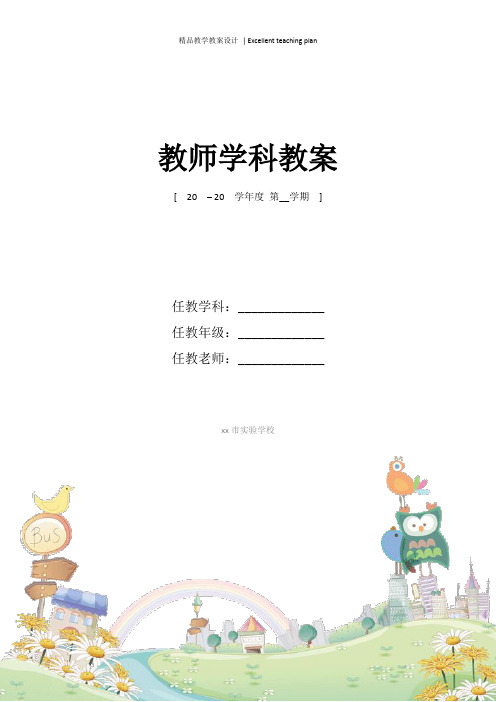
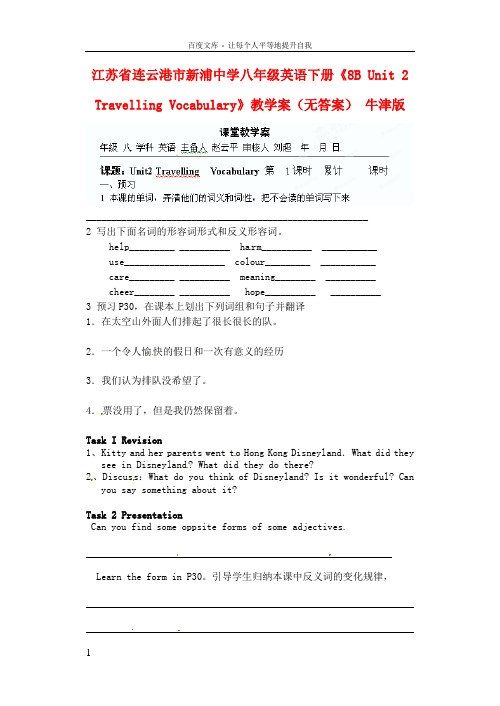
江苏省连云港市新浦中学八年级英语下册《8B Unit 2 Travelling Vocabulary》教学案(无答案)牛津版________________________________________________________2 写出下面名词的形容词形式和反义形容词。
help_________ __________ ha rm__________ ___________use____________________ colour_________ ___________care_________ __________ meaning________ __________cheer________ __________ hope__________ __________3 预习P30,在课本上划出下列词组和句子并翻译1.在太空山外面人们排起了很长很长的队。
2.一个令人愉快的假日和一次有意义的经历3.我们认为排队没希望了。
4.票没用了,但是我仍然保留着。
Task I Revision1、Kitty and her parents went t o Hong Kong Disneyland.What did theysee in Disneyland? What did they do there?2、Discuss:What do you think of Disneyland? Is it wonderful? Canyou say something about it?Task 2 PresentationCan you find some oppsite forms of some adjectives.Learn the form in P30。
引导学生归纳本课中反义词的变化规律,Task 3Practice Finish P 30 A and B用所给词的适当形式填空1. Lee is a _______student. He always _________ others in his class. (help)2. When all the people saw one of the seven _________ in the world. They cried: “___________!” (wonder)3. They waited for a long time because they ________ to visit inside. But it seemed to be ________ n ow. (hope)4. The road is ________ for us to reach the ________ of it. (end)5. Your n ew ________book makes everyone read it with ________. (delight)6. Miss Zhou gave him a _________book in class and he understood her _______ quickly. (meaning)7. Nobody will be ________ on such a _________ rainy day. (cheer)8. Our biology teacher told us that the ________ (colour) are always __________ (harm). Many of the time, if you don’t disturb them, they are __________ (h arm)【当堂巩固】一、词汇运用1. We h ave _________ (end) homework to do when we are going to have an exam.2. Betty is a kind and ____________ (help) girl. She is always ready to help others in need.3. T he lion gave a __________ (fear) roar.4. The __________ (thank) young man did nothing good for his parents.5. Mr Smith is a very ___________ (forget) person. He often forgets something.二、完成句子1. 我发现电视上的节目都是很没有意义的。
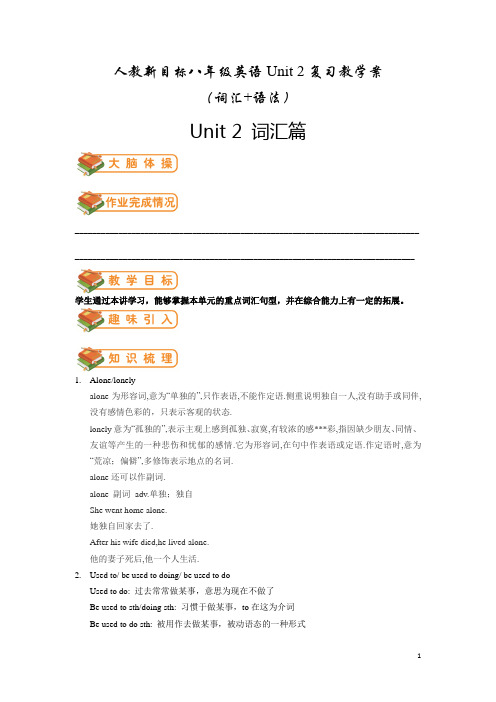
人教新目标八年级英语Unit 2复习教学案(词汇+语法)Unit 2 词汇篇_______________________________________________________________________________ ______________________________________________________________________________学生通过本讲学习,能够掌握本单元的重点词汇句型,并在综合能力上有一定的拓展。
1.Alone/lonelyalone为形容词,意为“单独的”,只作表语,不能作定语.侧重说明独自一人,没有助手或同伴,没有感情色彩的,只表示客观的状态.lonely意为“孤独的”,表示主观上感到孤独、寂寞,有较浓的感***彩,指因缺少朋友、同情、友谊等产生的一种悲伤和忧郁的感情.它为形容词,在句中作表语或定语.作定语时,意为“荒凉;偏僻”,多修饰表示地点的名词.alone还可以作副词.alone 副词adv.单独;独自She went home alone.她独自回家去了.After his wife died,he lived alone.他的妻子死后,他一个人生活.ed to/ be used to doing/ be used to doUsed to do: 过去常常做某事,意思为现在不做了Be used to sth/doing sth: 习惯于做某事,to在这为介词Be used to do sth: 被用作去做某事,被动语态的一种形式3.Give out/give awaygive away1.捐献,赠送He gave away most of his money to charity.他把大部分金钱捐给了慈善事业.2.颁发,分送The mayor gave away the prizes at the school sports day.在学校运动会那天市长颁发了奖品.3.(由于粗心)丢失、错过(机会)They gave away their last chance of winning the match.他们错过了比赛取胜的最后机会.give sth/sb away (有意无意地)泄露She gave away state secrets to the enemy.她向敌人泄露了国家机密.His broad Liverpool accent gave him away.他那浓重的利物浦口音暴露了他的身份.give sth. off放出(气味,热量等)The cooker is giving off a fuuny smell.锅里正在冒出一种怪味.give out1.用尽;耗尽Her patience finally gave out.她终于失去耐心了.2.(指引擎、发动机)停止运转;失灵One of the plane's engines gave out in the mid-Atlantic.在大西洋中部上空飞机的一个引擎失灵了.give sth.out1.分发;散发The teacher gave out the examination papers.老师分发了试卷.2.放出;发出The radiator is giving out a lot of heat.散热器散发着大量的热.3.宣布;广播The news of the President's death was giving out in a broad-cast.总统故去的消息在无线电中广播了.其中在表示“散发;放出(气味,热量等)的意思时,give off 和give out 的用法是一样的,都解释为"send out or emit sth."Put off/take off/get off/ set off 4.Interest/interesting/interestedInterest做动词意思为使别人感兴趣interest sb.Interesting 做形容词,多以物做主语,表示使别人感兴趣的Interested 做形容词,多以人做主语,表示对。
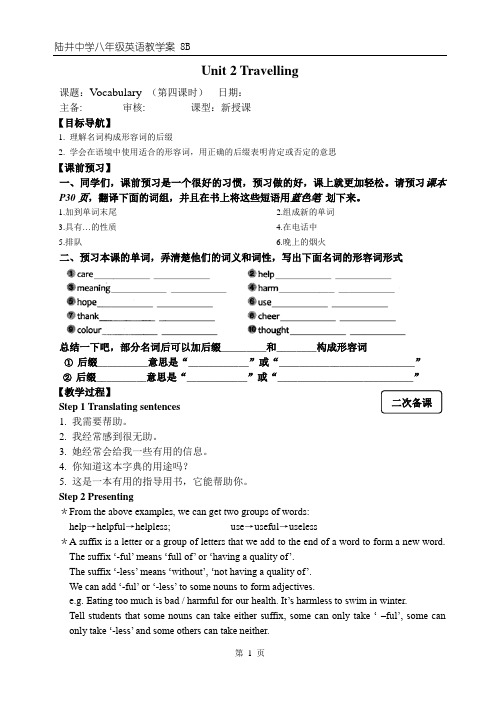
Unit 2 Travelling课题:V ocabulary (第四课时)日期:主备: 审核: 课型:新授课【目标导航】1. 理解名词构成形容词的后缀2. 学会在语境中使用适合的形容词,用正确的后缀表明肯定或否定的意思【课前预习】一、同学们,课前预习是一个很好的习惯,预习做的好,课上就更加轻松。
请预习课本P30页,翻译下面的词组,并且在书上将这些短语用蓝色笔划下来。
1.加到单词末尾_____________________________2.组成新的单词_________________________3.具有…的性质_____________________________4.在电话中____________________________5.排队____________________________________6.晚上的烟火__________________________二、预习本课的单词,弄清楚他们的词义和词性,写出下面名词的形容词形式总结一下吧,部分名词后可以加后缀_________和________构成形容词①后缀__________意思是“____________”或“___________________________”②后缀__________意思是“____________”或“___________________________”【教学过程】Array Step 1 Translating sentences1. 我需要帮助。
2. 我经常感到很无助。
3. 她经常会给我一些有用的信息。
4. 你知道这本字典的用途吗?5. 这是一本有用的指导用书,它能帮助你。
Step 2 Presenting*From the above examples, we can get two groups of words:help→helpful→helpless; use→useful→useless*A suffix is a letter or a group of letters that we add to the end of a word to form a new word.The suffi x ‘-ful’ means ‘full of’ or ‘having a quality of’.The suffix ‘-less’ means ‘without’, ‘not having a quality of’.We can add ‘-ful’ or ‘-less’ to some nouns to form adjectives.e.g. Eating too much is bad / harmful for our health. It’s harmless to swim in winter.Tell students that some nouns can take either suffix, some can only take ‘ –ful’, some canonly take ‘-less’ and some others can take neither.*Work in pairs to finish P30 A . If students are not sure, they can us a dictionary for help. delight→delightful; end→endless; noise→noiseless; wonder→wonderfulStep 3 PractisingAsk the students to make sentences with these groups of words.Step 4 PresentingWe have already learned that people can take the roller coaster in the Space Mountain. It’s really exciting. That’s why there are many people waiting outside. The line of people is end less.You have to wait for a long time. Maybe you have no hope to get in. (Maybe it’s hopeless for you to get in.)We have also known that the parade is the best part of the day. People are very happy and cheer ful. The performers all wear different colors of customs. They are color ful.People who have been there will never forget the wonder ful and delight ful holiday. Because it is a meaning ful experience. (an activity or event that affects you in some way)Step 5 PractisingKitty and Millie are talking about Hong Kong Disneyland on the phone. What’s Kitty saying? Fill in the blanks of Part B on page 30.Step 6 Sum up: What we’ve learnt today?【知识点辅助】考点1:k e e p的用法练练吧【课堂检测】一、用所给单词的正确形式填空:(10格*10=100’)care, use, help, wonder, color, harm, cheer, meaning, noise, delight1. Please be _________ with the glasses. Don't break them.2. He's always very _________ to his mother.3. The trains are __________ without the electricity.4. It's _________ to help others when they need help.5. It's a __________ opportunity.6. This snake(蛇)is unable to hurt you because it is _________.7. That girl likes _________ dresses.8. It was a _________ trip that I cannot forget.9. How _________ it is! I lost my way home.10. It's very _________ because of the busy traffic.【课后巩固】一、根据汉语意思完成句子:【能力拓展】一、根据短文内容和首字母提示补全短文School education is very i __ __ and u __ __ . No one can learn everything at school and a teacher cannot teach his students everything. His work is to show his students h_____ to learn. He teaches them how to read and how to think. So much more is to be learned outside school by the students themselves.It is always more n _ ____ to know how to study b oneself. It is quite e _ __ to learn something, but it is d __ ____ to use it to solve problems. Great inventors do not get everything from school, but they can make many things and c ____ the world a lot.【课时反馈】【家庭作业】 1.完成检测并复习本课时的内容。
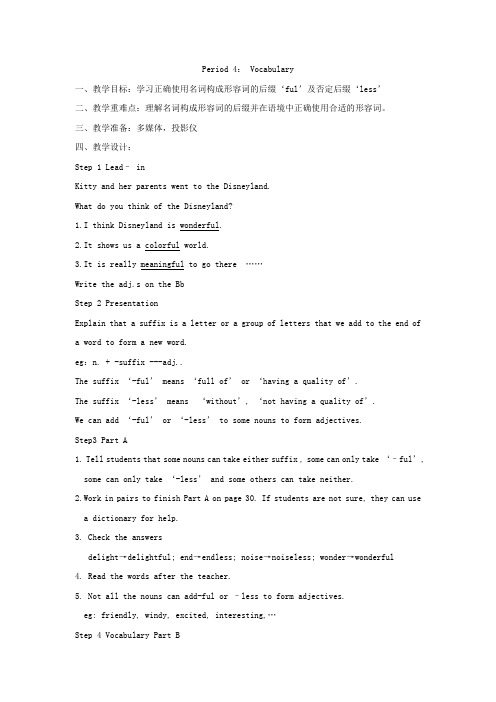
Period 4: Vocabulary一、教学目标:学习正确使用名词构成形容词的后缀‘ful’及否定后缀‘less’二、教学重难点:理解名词构成形容词的后缀并在语境中正确使用合适的形容词。
三、教学准备:多媒体,投影仪四、教学设计:Step 1 Lead– inKitty and her parents went to the Disneyland.What do you think of the Disneyland?1.I think Disneyland is wonderful.2.It shows us a colorful world.3.It is really meaningful to go there ……Write the adj.s on the BbStep 2 PresentationExplain that a suffix is a letter or a group of letters that we add to the end of a word to form a new word.eg:n. + -suffix ---adj..Th e suffix ‘-ful’ means ‘full of’ or ‘having a quality of’.The suffix ‘-less’ means ‘without’, ‘not having a quality of’.We can add ‘-ful’ or ‘-less’ to some nouns to form adjectives.Step3 Part A1. Tell students that some nouns can take either suffix , some can only take ‘–ful’, some can only take ‘-less’ and some others can take neither.2.Work in pairs to finish Part A on page 30. If students are not sure, they can usea dictionary for help.3. Check the answersdelight→delightful; end→endless; noise→noiseless; wonder→wonderful4. Read the words after the teacher.5. Not all the nouns can add-ful or –less to form adjectives.eg: friendly, windy, excited, interesting,…Step 4 Vocabulary Part B1.Let students finish the exercise B on P30.2.Check the answers.3.Oral work: Brain storm (let one student choose one of the adjectives to makeone sentence, and his or her desk-mate use the opposite to make a sentence. One pair by one pair. Which group can do the best?)4.Do some more exercises.Step 5 Homework1.Remember the adjectives and the opposites.2. Write a short passage to talk about one of your classmates. Tell why you likehim or her with the adjectives and the opposites.。

八年级下册unit2教案The Second PeriodI.Teaching Aims and Demands1.Knowledge Objects(1 )Key vocabularycan;could;call up;argument(2)Key structuresWhat should I do?You should write him a letter.What should he do?Maybe he should say he's sorry.What should they do?They shouldn't argue.2.Ability ObjectsTo train students' listening skill.To master some grammar rules.3.Sensibility and ValueTo enjoy helping others when they have trouble.Cooperation is very important.To help students realize the importance of cooperation.II.Teaching Key PointsKey vocabulary.Key structures.III.Teaching DifficultyGroupwork.IV.Teaching MethodsListening and speaking methods.Communicative competence.Cooperating method.V.Teaching AidA tape recorder.VI.Teaching Procedures"Step IGreet the class as usual and check the homework.Ask some students to report their parents or friends problems and the advice they gave them.Give them little presents if some of them do their work well."Step IIWrite the new words on the board and teach them.Ask students to repeat the new wrods.And make sure they can understand them.could «wxv,(can 的过去式)call叩打电话给某人argument n.争论;争吵;意见不合bStep III 2aIn this activity first ask students to look at the picture.Tell students they are talking about the problem.Say,Now you'll hear a conversation between Nari and a friend.Circle the word could or should you hear.Ask students to look at the chart in activity la.Show students the first column and ask a student to read it to the class.S: l.My parents want me to stay at home every night.2.My brother plays his stereo too loud.3.1don't have enough money.4.1argued with my best friend.5.My clothes are out of style.T:Very Good.Sit down,please.Now listen to the conversation.Write Nari's problem on the blank lines.Then play the recording the first time.This time students only listen.And play it a second time.As they listen to the recording this time,ask students to write Nari's problem on the blank lines in activity 2a.Then check the answers.AnswersI argued with my best friend.(This activity provides students listening practice using the target language.)TapescriptBoy l:Hey,Nari,what's wrong?Boy 2:1 had an argument with my best friend.What should I do?Boy 1: Well,you could write him a letter.Boy 2:1 don't think so.I don't like writing letters.Boy 1:Maybe you should call him up.Boy 2:No,I don't want to talk about it on the phone.Boy 1:Well,you should say you're sorry.Boy 2:Yes,I know I should,but it's not easy.Boy 1:Maybe you could go to his house.Boy 2:1 guess I could,but I don't want to surprise him.Boy 1:Hey,I know.You could give him a ticket to a ball game.Boy 2:Well,that's a good idea,but I don't have enough money.bStep IV 2bThis activity provides listening practice using the target language.First read the instructions.Show students the example match.l.You could write him a letter.I don't like writing letters.Ask students to listen again and draw lines to match the advice and the reasons.Like the sample match.Then play the recording again.Check the answers.Answersl.d 2.e 3.a 4.c 5.bbStep V 2c GroupworkThis activity provides guided oral practice using the target language.This activity demands students to role play the conversation between Nari and his friend.First tell students how to do this activity.Point to the example in the sample dialogue.Ask two students to read the conversation to the class.Point out the sentences in activity 2b.Ask two students to role play a conversation between Nari and his friend using these two sets of sentences.For example,Sa:What's the matter,Nari?S&I argued with my best friend.S a:Maybe you could call him up.Sb:I don't want to talk about it on the phone.Help the students when necessary.Then have student work in pairs.First one student is Nari and the other student is Nari's friend.Then the two students change places.At the end check the answers by calling on different pairs to say a conversation to the class.Praise them for their good job.""Step VI Grammar FocusReview the grammar box.Ask students to say the questions and the responses.Point out that the word should is always used to ask for advice,but the words could,should,and shouldn't are used to give advice.Explain that the word could is a less serious word than s/io诚d.Say,When you say someone could do something,it means that your advice is just one idea of many different ideas.When you say someone should do something,it means that your advice is the best idea or the only e the word could when you are not very sure of your e should when you are very sure of your advice.bStep VH Pronunciation NoteThe " t" at the end of the word shouldn't is usually not pronounced.And the end of the word shouldn't is often combined with the beginning of the following word.For example,s。
八年级英语上册-人教版-Unit 2 教学设计一. 教材分析人教版八年级英语上册Unit 2主要介绍了日常生活中的一般疑问句,包括问候、介绍、询问时间、询问地点等场景。
通过本单元的学习,学生能够掌握一般疑问句的构成和用法,提高日常英语交流能力。
教材内容丰富,实用性较强,有利于激发学生学习兴趣。
二. 学情分析八年级的学生已经具备了一定的英语基础,对日常生活中的基本词汇和句型有所了解。
但部分学生对英语学习的兴趣不足,学习积极性有待提高。
此外,学生的英语水平参差不齐,教学过程中需关注不同层次学生的需求。
三. 教学目标1.知识目标:学生能够掌握一般疑问句的构成和用法,正确运用所学知识进行日常交流。
2.能力目标:提高学生的听、说、读、写能力,使其在实际情境中运用英语进行沟通。
3.情感目标:激发学生学习英语的兴趣,培养积极向上的学习态度。
四. 教学重难点1.重点:一般疑问句的构成和用法。
2.难点:一般疑问句在实际情境中的运用。
五. 教学方法1.情境教学法:通过设定各种日常生活中的情境,让学生在实际语境中学习、运用英语。
2.交际法:鼓励学生积极参与课堂互动,提高实际英语交流能力。
3.任务型教学法:通过完成各种任务,激发学生学习兴趣,巩固所学知识。
六. 教学准备1.教学素材:准备相关的图片、视频、音频等教学素材。
2.教学设备:投影仪、计算机、音响等教学设备。
3.作业布置:提前布置相关预习任务,让学生预习本节课的内容。
七. 教学过程1.导入(5分钟)利用图片、视频等素材,引入本节课的主题,激发学生学习兴趣。
同时,检查学生对上一节课内容的掌握情况。
2.呈现(10分钟)通过展示图片、实物等,呈现本节课的主要内容,引导学生观察、思考。
同时,用英语介绍一般疑问句的构成和用法。
3.操练(15分钟)将学生分成小组,进行角色扮演,模拟日常生活中的场景,运用一般疑问句进行交流。
教师巡回指导,纠正发音和语法错误。
4.巩固(10分钟)设计一些练习题,让学生填写或回答,巩固对一般疑问句的理解和运用。
Unit 2How often do you exercise?第一课时Section A(1a-2d)Teaching Goals【教学目标】Key words:housework,hardly,ever,once,twice,Internet,program,full,swingKey phrases:how often,on weekends,go to the movies,help with housework,hardly ever,go shopping,once/twice a week/a month,swing danceKey sentences:1.What do you usually do on weekends?I often go to the movies.2.How often do you watch TV?I watch TV every day.Teaching Key Points【教学重点】The vocabulary:housework,hardly,ever,once,twice,how often,on weekends,go to the movies,go shopping,help with housework,once/twice/three times a week/a month Target language:What do you usually do on weekends?I often go to the movies. Does he go shopping?No,he never goes shopping. How often do you have piano lessons?Twice a week,on Wednesday and Friday.Teaching Difficult Points【教学难点】1.The adverbs of frequency:always,usually,often,sometimes,hardly ever,never2.Target language above.Teaching Aids【教学工具】An English textbook,a tape recorder,CAI or courseware.Teaching Steps【教学过程】★Step 1Leading in1.Greetings:Talk about something the students did on summer vacation.2.Check the homework.★Step 2Pre-taskPage 9,1a.1.Look at the picture.2.Name each activity.T:What are they doing?S:They are shopping/reading/exercising/watching TV/helping with housework. (Help the students to answer.)3.Write the activities on the line.4.Check the answers on the board.5.Practice reading.Page 9,1c.1.Focus on the conversation in the box.2.Practice reading.3.Pair-work:What do you do on weekends?I...4.Group-work:Divide the class into groups of four or five. Make conversations. First S1 to S2:S1:What do you do on weekends?S2:I...S1:What does she/he do on weekends?S2:She/He...5.Act out their own dialogues.★Step 3While-taskPage 9,1b.1.Look at each picture above 1a.Tell what the person does on weekends. Check the Ss orally.2.Make sure what they will hear and do.3.Read these adverbs and explain.4.Play the tape twice. Write the letters on the line.Page 10,2a & 2b.1.Read the activities and the answers of “how often” first.2.Practice reading.3.In 2a we should know the activities you hear. In 2b we should know the answers of how often he does the activities.4.Play the tape for the first time. Ss only listen.5.Play the tape a second time. Ss do 2a.6.Play the tape a third time. Check the answers.7.Play the tape. Ss do 2b.8.Check the answers.In this part,we should pay attention to “how often” cause of special questions and answers.★Step 4Post-taskPage 10,2c & 2d.1.Focus on the conversation in 2c first.2.Practice reading.3.Read the activities in the left box.4.Fill in the chart.5.Pair-work:Make conversations.6.Make students scan the conversation in 2d.7.Teach and then make Ss role-play the conversation in pairs. In this part,student A will be Jack. Student B will be Claire. As they talk,move around to monitor their work. Offer language or pronunciation support as needed.8.Have a group of students present their conversation to the class.★Step 5Homework1.Practice the conversation in 2d.2.Do the exercises on Page 8 in students' book.Board Design板书设计Unit 2How often do you exercise?The first period Section A(1a-2d)1.Key vocabulary:housework,once,twice,full,how often,on weekends,go to the movies,help with housework,hardly ever,once a week,three times a month 2.表示动作的频率由高到低依次是always(100%),usually(80%),often(30%~50%),sometimes(20%),hardly ever(5%),never(0%)。
总课题Unit 2 Travelling总课时10第4课时课题课型New教学目标knowledge1. words: cheer, delight, harm, meaning, line2. phrases: get inside, enjoy the parade.3. sentence patterns: It seemed to be…4. grammar: the suffix ‘ful’ and ‘less’. competence To de velop an understanding of suffixes moral The same as the last period教学重点难点1.To develop an understanding of suffixes2.To use appropriate adjectives in context, using the correct suffix to indicate positive or negative meanings教学过程教师活动学生活动Step One :Leading – inUse an adjective and its opposite to make a sentence about the students in the class: Helen is a careful student. But Henry is a careless one. Write ‘careful’ and ‘careless’ on the Bb. Tell the students that these two word’s original form is ‘care’-a noun. It’s a noun. Underline ‘ful’ and ‘less’. Let them make some sentences like this. Write all the adjectives on the Bb. Step Two :Pre – task1.Ask the Ss to think about how to form an adjective and it’sopposite from a no un. Then sum up the rules. That is toadd suffix ‘ful’ and ‘less’.2.Let the stude nts guess some meanings of the underlinewords in the sentences.* A: Do you understand the meaning of this passage?B: The meaning is ‘Study hard when you are young’.A: Oh, it’s a meaningful sentence.* It’s harmful for your health to smoke. But exercise is harmless for your health.* I like watching Zhou Xingchi’s films with delight.They really make me delightful.* I heard the cheers of the crowd, and I knew that ourteam was winning. All the players were very cheerful.But for the other team, today was a cheerless day.Give the students some time to think about. For weaker students, give them some hints. Then check the answerstogether.discussingpair workpair workStep Three :While – taskTask 1 Ask the Ss review the rules again. Then fill in theblanks of the table.名词中文意思形容词反义形容词colourthankcarehelpuseharmmeaningdelightcheerendhopewonderTask 2 Write the correct form of the given word in thesentence.4. The road is for us to reach the of it. ( end )5. Your new book makes everyone readwith . ( delight )6. Miss Zhou gave him a look in class and heunderstood her quickly. ( meaning)7. Nobody will be on such a rainy day. ( cheer )8. Our biography teacher told us that the ( colour )snakes are always . Most of the time, if you don’tdisturb them, they are . ( harm )Task 3 Fill in the blanks with the correct suffixes in Part B.Step Four: Post-taskGroup work: Four students a group. Ask them to make twosentences each group with an adjective and its opposite.Compare which group’s work is the most excellent. Thenadd some marks for the m.Wriiten workGroup workStep Five Homework5.Finish the exercises in exercise book.Find more suffix as many as you can. Sum up different rules.On Bb:名词中文意思形容词反义形容词colourthankcarehelpuseharmmeaningdelightcheerendhopewonder后记:the suffix seems easy, but if the students learn well ,it will help them a lot in later study.。
8B Unit 2 TravelingV ocabulary鲁河中学陈寿红Teaching aims:1.To develop an understanding of suffixes2.To use appropriate adjectives in context, using the correct suffix to indicate positiveor negative meaningsTeaching procedures:Step 1 Remind students that they learned about prefixes in Book 8A, Unit 5. Tell them that a suffix serves a similar purpose, but it goes at the end of a word. Tell them that the suffix ‘-ful’ means ‘full of’ or ‘having the qualities of’, e.g. ‘colourful’, ‘thoughtful’. The suffix ‘-less’ means ‘without’, e.g. ‘meaningless’, ‘hopeless’.Step 2 Tell students that some nouns can take either suffix, some can only take ‘-ful’ some can only take ‘-less’ and some can take neither.Step 3 Read out the examples in the table at the top of gage 26. Ask students t think of some sentences using the positive and negative adjectives listed. Write the sentences on the board. Step 4 Ask students to read the list of nouns in Part A. Check students’ understanding of each word.Step 5 Ask students to complete Part A. Tell them to use a dictionary for words they are not sure of.Step 6 When students have finished, ask nine students to read out one row of the table each. Write the words on the board so students can check their spelling. Tell more able students to do the extra exercise.Step 7 Explain the context of Part B. Sandy is telling Millie about her trip to Japan. Ask students to complete what Sandy says on their own. Tell them that all the words they need can be found in the two tables above.Step 8 Ask a volunteer to read out Sandy’s completed speech bubble. Ask another student to write the words with suffixes on the board.Step 9 Tell students that Mr. Wu wants to put some articles on the notice-board. He asks Daniel to write an article about his trip to Disneyland. Help Daniel complete his article. Use the words from the box. Add ‘-ful’ or ‘-less’. Students check the answers with their partners. When students have finished. ask some more able students to read out their answers to the others.一根据提示写出单词1The little girl is __________(快活的) and she’s always ________(充满希望的) about her future.2I hope you will have a ________(愉快的) holiday.3Smoking is ________(有害的) to our health..4My life has lost all its meaning. It is __________(无意义的).二用后缀-ful. -less填空One day the traffic was heavy on the city roads. The cars were end_____. It seemed to behope____ to walk across the street. It was use_____ for us to wait and see. So we decided to walk over the footbridge. My daughter was cheer____ in her colour____ dress. She always thought that life was meaning_____ and wonder______ . But to her surprise, she found that a 3-year-old boy was begging on the footbridge. He looked so help______ .Why doesn’t he go back home? She asked. I didn’t know ho w to answer it.三完成句子1我昨晚太累了以致于没完成作业就睡了.I was ___________ that I ________________ without finishing homework last night.2昨天我到家时我妈妈正在煮饭.My mother___ ___________ when I _____________ yesterday.3他一边看电视一边做作业.He __________________ while _________________ .4随身带一张地图似乎是没用的.It ___________________________-_ take a map with you.5不要马虎,你应该万事小心.Don’t ______________ . You should __________________ with everything.。
( 英语教案 )
学校:_________________________
年级:_________________________
教师:_________________________
教案设计 / 精品文档 / 文字可改
八年级英语:Unit 2 Vocabulary
教学案(参考文本)
Learning English is conducive to making friends, chatting or working together with foreigners, and learning English is very useful for traveling abroad.
八年级英语:Unit 2 Vocabulary教学案(参
考文本)
unit 2 vocabulary教学案
课前预习
一.写出下列单词的反义词
1.necessary
2.important
3.popular
eful
5.interesting
6.easy
二.单词填空。
1.which do you like better,history or (地理)?.
2.english is an important (语言)。
.
3.this book is very (有用)please read it carefully .
4.this math problem is so (难)that i can’t work it out ..
5.it is (不重要的)for us to go there..
6.edison is one of the great (science)in history..
7.it is (无用的)only speaking without doing..
8.this book is (有用的)for young students..
三.用所给词填空。
1.our g teacher tells us the earth is like a big ball.
2.in canada people speak different l .
3.tom often makes noise in class , so he is an u student.
4.these things on the desk are (use )。
you can throw them away.
5.the film is so (bore)that nobody in our class likes it.
6.are you feeling (well)now?
7.the lady is (bore).she has no one to talk to.
8.we make (joke) about his new cap。
四.翻译。
1.英语是世界上最重要的语言之一。
english is one of in the world..
2.和她争论是没有用的。
it is argue him
3.多么容易的一个问题啊。
question it is.
4.我的好朋友和我一样强壮。
my g ood friend is me.
integrated skills
一.写出写列单词的比较级和最高级
1.few
2.many
3.little
4.much
5.small
rge
7.与…一样的颜色 8.参与写作比赛
二.单词填空。
1.my school is (small)than yours.
2.there is (little)water in this river than in that one.
3.i have (最少的)milk of all.
4.there are (最多的)advertisements,when you watch your favourite tv programmes.
5.the changjiang river is one of the longest .(river) in the world.
6.this is a (真实的)story..
7.lucy has (much)money in her class.but her brother has (little)
三.翻译。
1.在中国大多数学生放三个星期的寒假.
most students in
winter in china.
2.老板准了她三天的假照顾她生病的儿子。
.the boss gave him so that she could
her sick son
3.去年这个男孩就能骑车了。
this boy ride a bike last year. 4.莉莉用最少的钱把它做得很好。
lucy did it well with .
5.在所有人中艾米的橙汁最少。
amy has of all.
6.我的鞋子和你的一样。
i have you.
7.我的外衣颜色和她的一样。
my coat is .hers.
8.他太年轻不能参军。
he is young the army.
9.他们都加入唱这首歌。
they all singing the song .
可在这填写你的名称
YOU CAN FILL IN THE NAME Here。